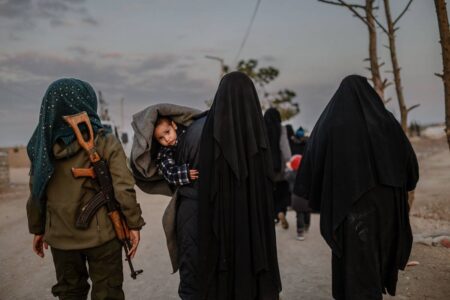
Syrian camp housing Islamic State families hit by wave of murders
A camp in Syria housing families of Islamic State militant group fighters has experienced a wave of murders within a little over two weeks, the United Nations said Thursday, while expressing “serious concern” at the camp’s “deteriorating security conditions.”
Located in the northeastern Al-Hasakah governorate, Al-Hol is Syria’s largest refugee and displacement camp, counting nearly 62,000 residents. According to the U.N., women and children make up for more than 80 percent of Al-Hol’s population.
The camp, which is run by Kurdish forces, is notorious for hosting foreign wives and children of ISIS fighters. Many of the families ended up in Al-Hol following the fall of the so-called caliphate in March 2019.
According to a statement by the U.N.’s Office for the Coordination of Humanitarian Affairs (OCHA), 12 Syrian and Iraqi camp residents were murdered within the first 16 days of January, with another person left critically injured from a violent attack.
“The disturbing events indicate an increasingly untenable security environment at Al Hol,” the statement read.
Aside from identifying one casualty as a female Iraqi refugee, OCHA did not further specify the identities of victims or perpetrators.
“The recent rise in violence among the camp population not only represents a tragic loss of life, it also jeopardizes the ability for the UN and humanitarian partners to continue to safely deliver critical humanitarian assistance and services to residents,” OCHA added.
OCHA previously reported at least 16 murders in Al-Hol between August and September 2020, with 10 of the killings having occurred in September alone. The murders mainly affected the camp’s Iraqi refugee population. OCHA found factors behind the violence to include accusations of collaboration with authorities, so-called “honor killings” and ISIS activity.
According to Syria-based news agency Rojava Information Center, Al-Hol experienced attacks carried out by women affiliated to ISIS in November 2020, which resulted in seven assassinations of mostly Iraqi victims.
In addition to security threats, Al-Hol’s residents have languished in the overcrowded camp’s squalid conditions.
In August 2020, Médecins Sans Frontières’s emergency manager for Syria stated Al-Hol “lacks basic water and hygiene infrastructure.” He added the camp has “almost no healthcare available” due to closures of multiple health facilities, leaving residents vulnerable to COVID-19. Coronavirus cases have been identified in the camp.
Despite aid organizations sounding the alarm on conditions in Al-Hol, many nations showed little interest in allowing citizens suspected of ISIS affiliation to come home, citing security risks. While certain countries, such as Germany, permitted some repatriations, others controversially disowned their nationals.
One cause célèbre among foreign ISIS wives stranded in Syria has been Shamima Begum, one of three British schoolgirls who fled London to join the extremist group in the war-torn country.
The U.K. government moved to strip Begum of her citizenship in 2019, a decision the now 21-year-old woman has fought in court. In July 2020, the Court of Appeal ruled Begum could return to the U.K. to attend her case in person.
Begum initially resided in Al-Hol, but was moved to a different Syrian camp in March 2019 following threats to her life.
Source: Newsweek





